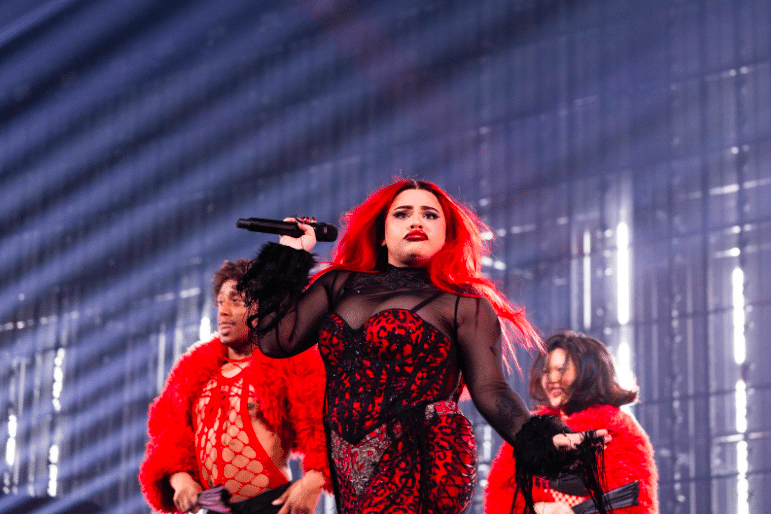Yes, you read right. Malta wants to win Eurovision – and the race to win MESC 2026 has already begun! A couple of weeks ago, ESCBubble was invited by PBS and the Maltese Eurovision delegation to attend a few sessions of the MESC 2026 songwriting camp.
This initiative is on its third year and is an opportunity for local artists and songwriters to team up with foreign creatives on potential Eurovision submissions. Artists are grouped up with producers, lyricists and composers, local or foreign and get around 6 hours to work on a song from scratch. At the end of the session, the song is essentially just a demo which is then worked on during the summer months. When submissions open in September, the artists can choose to either submit the song or not.
During this year’s camp, a total of 70 songs were written. After every two days of writing, a listening party is organised where the artists, writers, lyricists, producers and in this case, myself, had the opportunity to listen to the first demos of the songs. It is worth mentioning that from the 70 songs that were written, I had the opportunity to hear 42. Although I did not hear all the songs and I do not know how many of these songs will be submitted and potentially reach the live semi finals, one thing is clear. The attention that the Maltese participation got in the run up to the 2025 Eurovision in Basel has definitely motivated artists to come up with competitive material.
Which artists attended the camp?
For those who have a close eye on the official Instagram page of MESC, it is no secret that many former MESC artists from recent years have written a song during the camp. Notable names include Adria Twins, Maxine Pace, Ryan Hili, Victoria Sciberras, Matt Blxck, Denise Mercieca, Kristy Spiteri, Franklin Calleja, Krista Šujak, Stefan Galea, Fabrizio Faniello, Jessika, Miguel Bonello, Mark Anthony Bartolo and Justine Shorfid among many others.
However, MESC is not just an alumni party. Among the artists present, there were some former Maltese Eurovision and Junior Eurovision participants. One of the most surprising appearances was that of Michela Pace, who represented Malta in 2019 with ‘Chameleon.’ From the Junior Eurovision hall of fame, Federica Falzon and Gaia Gambuzza have also been spotted in the recording studios in Valletta. They both represented Malta at Junior Eurovision in 2014 and 2022 respectively.
Malta’s most prominent pop star, Aidan Cassar was also in the house. It is rumoured that he was there both as an artist and as a songwriter. Other notable artists at the camp that have never participated at MESC before include X Factor Malta finalist Amelia Kalabić, Mużika Mużika breakout star Hannah Theuma, Sarah Micallef Muscat, a local singer who went viral for creating Maltese covers of Disney soundtracks, and Lon Kirkop, known for his unique lyrical content in Maltese. He was also the lyricist behind Ramires Sciberras’ ‘Stilla Ckejkna’ which came fifth at last year’s Junior Eurovision Song Contest and is to date the most successful song in Maltese in any Eurovision event ever.
Who were the songwriters at the camp?
This MESC songwriting camp has hosted the highest number of local writers and producers in three editions. Notable names that wrote songs for numerous artists include Matt ‘Muxu’ Mercieca, Emil Calleja Bayliss, Peter Borg, Matteo Depares, Klinsmann Coleiro, David Meilak, Jean Paul Borg, Lon Kirkop, Christina Magrin, Gerard James Borg, Aidan Cassar and Matt Blxck. Former Maltese Eurovision representatives Miriana Conte and Sarah Bonnici also attended the camp and made their songwriting debuts.
On the list of foreign creatives, notable names included Linnea Deb, Melanie Wehbe, Andreas Lindbergh, Felicia Lu, Bas Wisnik, Silke Montsko Blandkjenn and Audun Agnar Guldbrandsen among many others.
But that’s not all…!
This songwriting camp is not just an opportunity for artists and writers to work on Eurovision material. During some of the days, PBS organised lectures and panel discussions for artists and songwriters to attend where they can benefit from different perspectives from professionals in the Eurovision field. This initiative then helps artists in all aspects of their potential participation.
One of the panel discussions involved three individuals from fan media, and I had the privilege to be one of the journalists who provided a perspective for the artists and writers. The session was called ‘How to create hype around your entry’ and together with Cinan from Wiwibloggs and Tatiana from Blogovision, a discussion was held and was attended by multiple artists and songwriters. Areas discussed included branding, authenticity, artistry, how to create a song that will be respected by the public, and how to use a Eurovision participation optimally among others. During these discussions, artists and writers also gave their input and shared their perspectives and insights.
This was my first time attending a songwriting camp intended for Eurovision, and the first time that fan media was involved in the MESC songwriting camp. Although we will likely get a clearer picture of what’s been cooking during these sessions once the competing entries are released in January, I can confidently say that fan media being a part of this initiative was a welcome initiative. Other broadcasters can only learn from PBS and the Maltese delegation for using all that’s in their power to expose artists to the best resources in the industry which will undoubtedly give them the best chance at creating a song that can win Eurovision.
I would personally like to thank Angie Laus, Gordon Bonello, Rodianne Caligari and Kevin Lee for putting this together and inviting us for being part of this experience. It is truly a rewarding feeling when fan media is being asked to contribute to a delegation’s effort in their next Eurovision participation!
What are you expecting to come out of the MESC 2026 songwriting camp?
